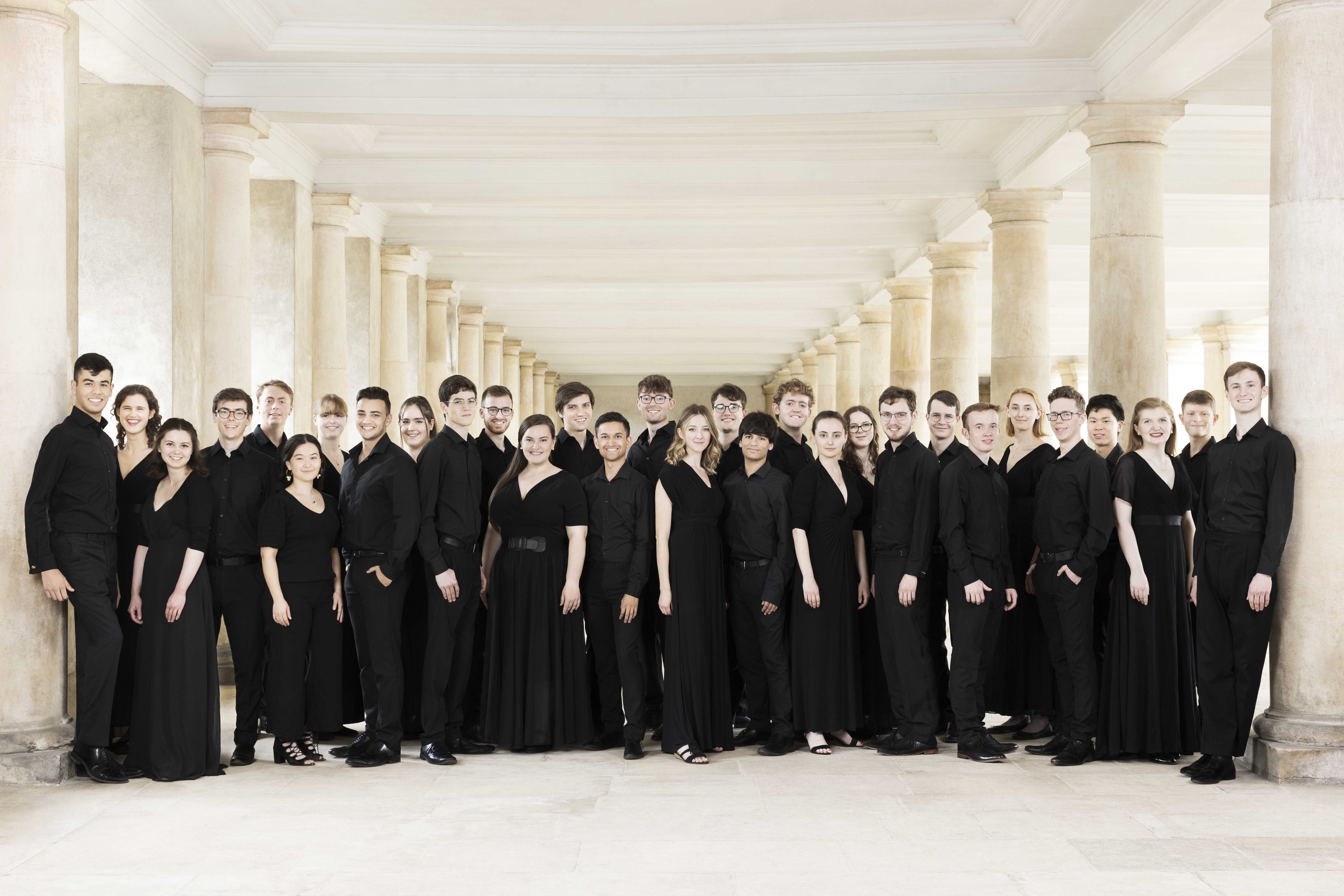Canada Tour, Jul 2014 - Large Stage Live
> See concert details...Choral Splendour
Every summer the Festival of the Sound runs for 3 1/2 weeks in Parry Sound, Ontario, presenting an eclectic programme rooted in classical chamber music, but ranging much more widely into many diverse styles and genres. I’ve been attending regularly ever since 1994, so this is my 21st season. I’m taking in so many concerts that I can’t possibly write each one up separately, so I’m going to deal with them in batches.
The remarkable Trinity College Choir of Cambridge last appeared at the Festival 2 years ago, and this year they returned for the gala opening of the Festival’s 35th season. This body of 32 student singers has been voted one of the world’s top five choirs by readers of Gramophone magazine, and with good reason. It’s almost superfluous to comment on the excellence of tone, blend, diction, and musical interpretation — all these things we can take totally for granted. The irony, of course, is that the singers do not take any of that for granted but work very hard to achieve the excellent results which we, the audience, then enjoy.
Their programme was delivered without intermission. The first four numbers, indeed, were sung without any pause between them, allowing for a cumulative build-up of the impact of the choral writing. This group included several works from the 1500s, the golden age of vocal polyphony, and the clarity of the intertwined vocal lines was noteworthy. So too was the rich, dark voice of the (uncredited) bass who delivered the plainsong intonations between the refrains in Loquebantur variis linguis by Thomas Tallis.
The next work was substantial: the choral motet Der Geist hilft by J. S. Bach. Some older members of the audience may have been surprised that this was sung with the accompaniment of a chamber organ, but recent scholarship has demonstrated pretty conclusively that earlier ideas of unaccompanied performance of the Bach motets were erroneous. This is a particularly intricate piece, full of lively rhythms and high-speed enunciation issues, and the choir certainly did it with skill and flair in equal measure.
The next work was written specially for the choir by one of its members! Owain Park, organ scholar at Trinity College, composed Judas mercator pessimus in a style both modern and intriguing. A small group of four singers went to the back of the hall on an upper level to provide a distance effect. The sound of this small body was sometimes submerged in the much louder sound of the main group, only to reappear in the sudden silence when the main choir’s chord ended — and usually on a starkly clashing chord. The vocal lines grew outwards from unisons into shimmering tone clusters as voices diverged briefly from the main note and then returned. Sudden staccato outbursts gave the effect of shouts of anger. If this sounds not very user-friendly, I can only say that I found it totally gripping and definitely wanted to hear it again.
The biggest single work on the program was Sir Hubert Parry’s choral song cycle Songs of Farewell. These songs were composed near the very end of his career, a career which had given rise to such enduring standards as the hymn Jerusalem and the coronation anthem I was glad. The six numbers form together into a kind of musical last testament, both in terms of the poetry Parry chose to set, and in terms of the musical skill demonstrated. The first of the six songs is in standard four-part harmony, and the harmonic sophistication increases through the cycle to the 7 voice parts of # 5 and the 8 parts of # 6. It’s interesting that the composer, who had long espoused Darwinian and humanist beliefs, yet chose to end with a setting of Psalm 39, a text that had also attracted Brahms in his German Requiem. Parry’s treatment of this psalm, which affirms that life must have an end, is sensitive, powerful, and — in the end — dwindles slowly away into uttermost darkness. This poignant and gripping ending was the high-water mark of the choir’s performance for me, the tone remaining audible down almost to the vanishing point with nary a quiver or shake.
I would have preferred for the program to end at this point, or at least to have had an intermission, as I would have liked some time to ponder and absorb the music I had just heard — sure sign for me of a true masterwork. However, the choir concluded the printed program with two pieces by contemporary American composer Morten Lauridsen. After doing a bit of reading about him, I would certainly like to hear more of his music. Sadly, the two pieces we heard made not too much of an impression on me after the intensity with which the Parry ended.
The choir, conductor, accompanist, soloists and composer were given a well-deserved standing ovation at the end of the program. Their encore was a jolly, lively treatment of the classic children’s song The Teddy Bears’ Picnic, which had the audience chuckling gleefully and then cheering heartily again at the end.
Ken Stephen
